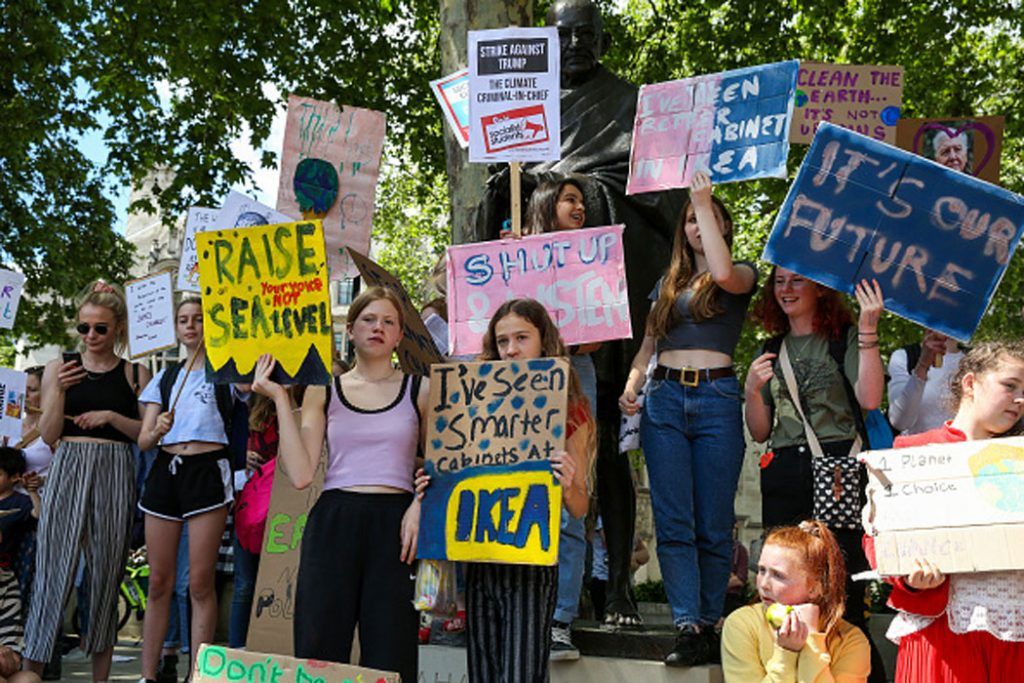UK Labor Party would make firms fight climate change—or lose contracts
By Fiona Harvey | June 2, 2019
 Students in London, holding placards during the Youth Strike for Climate Change Protest. (Photo by Dinendra Haria/SOPA Images/LightRocket via Getty Images)
Students in London, holding placards during the Youth Strike for Climate Change Protest. (Photo by Dinendra Haria/SOPA Images/LightRocket via Getty Images)
Editor’s note: This story was originally published by The Guardian. It appears here as part of the Climate Desk collaboration.
Companies bidding for public sector contracts will be forced to take radical steps to tackle the climate crisis under new regulations being proposed by the UK’s Labour party, addressing energy use, greenhouse gas emissions and waste.
If elected, the party would force suppliers to “put people and planet before profit,” with the threat of losing contracts if they do not, in a stark redrawing of priorities for contract bidders.
The government buys goods and services worth about £284 billion from the private sector every year, making it one of the biggest single customers for many private sector companies. The proposed changes would force companies to take a much greater role in combating the climate emergency, and have a knock-on effect across the business sector as they would be more likely to replicate those standards in other non-public sector work.
If it was elected, Labour would also ensure the public sector bodies that deliver goods and services, including the NHS, would have to adhere to higher green standards. Shadow ministers have already pledged to “insource” more goods and services to the public sector, rather than favouring private companies.
Standards on trade union recognition, late payments and tax compliance would also be updated and enforced.
Jon Trickett, the shadow minister for the Cabinet Office for the Labour party, said: “For too long large firms have enjoyed the immense benefits that come from public sector contracts, but have failed to protect the public good. There is no greater public good than our planet and the environment – businesses must deliver decisive action.”
Labour has pledged action on climate change to meet the “net zero carbon”target for 2050, recommended by the Committee on Climate Change in a recent landmark report. The party was also instrumental in having parliament declare a climate emergency. If followed through, both would require much greater action on carbon dioxide emissions across the economy but senior figures in politics and civil society are concerned they could be forgotten among other political priorities if pressure is not kept up.
Trickett said: “Labour will ensure that every firm providing goods and services to the public sector puts people and planet before profit. The stakes demand nothing less.”
The move may end up costing the Treasury and government departments more in the short term, because contracts are currently awarded largely to the lowest bidder, and cutting carbon dioxide emissions may require bidders to increase their investments. But Labour believes it will save money in the longer term and provide improvements in vital areas such as climate change, air pollution, health and other social benefits.
Aaron Kiely, climate campaigner at Friends of the Earth, said: “The UK parliament has declared a climate emergency and all areas of government and business must respond to this crisis as quickly as possible. Making sure public money supports public good by only giving government contracts to green suppliers is a sensible start, and will lay down a clear marker for companies to comply.”
The party has examined the current standards for bidders to supply the public sector, and believes the new pledges could be delivered with relatively minor changes to regulations.
The proposals are part of Labour’s “green industrial revolution,” which has been championed by Corbyn and would involve new investment in renewable energy such as solar panels and cleaner forms of transport. It also follows mooted proposals to delist UK companies that fail to take action on the climate emergency, though that would be more complex. Public sector contracts are considered a good place to start because they are within the government’s control and many companies rely on the hundreds of billions they pay out each year.
Perhaps unusually for Corbyn, who has often been defined in opposition to former Labour prime minister Tony Blair, the new plans are a redrawing of previous attempts by Blair more than a decade ago to use public sector procurement to force suppliers to make changes to their practices. A task force was set up in 2006 on how to “green” public sector contracts. The initiative foundered, however, when it met resistance from suppliers and public sector procurement specialists, who argued it would force a rise in costs for the government. After the financial crisis, little more was heard of it.
Together, we make the world safer.
The Bulletin elevates expert voices above the noise. But as an independent nonprofit organization, our operations depend on the support of readers like you. Help us continue to deliver quality journalism that holds leaders accountable. Your support of our work at any level is important. In return, we promise our coverage will be understandable, influential, vigilant, solution-oriented, and fair-minded. Together we can make a difference.
Topics: Analysis, Climate Change














